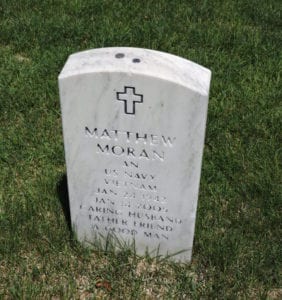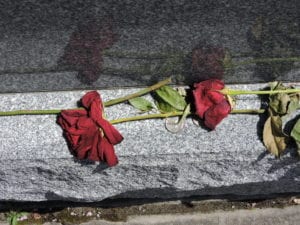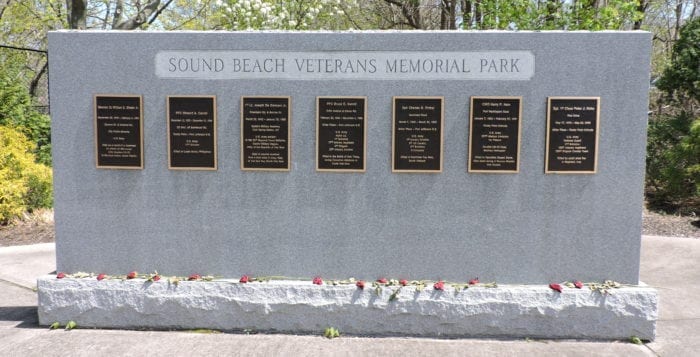By Ernestine Franco
A few weeks ago, Ann Moran, a member of the board of the Sound Beach Civic Association, was getting the Sound Beach Veterans Park’s garden ready for its upcoming Memorial Day celebration when she noticed something she had never seen before.
On the horizontal slab of the granite stone that displays the plaques of the seven fallen veterans of Sound Beach, someone had left two coins in front of each plaque, two quarters to be exact, and she wondered why. Moran knew that people sometimes leave a small stone on a headstone in a cemetery to indicate that they had been there but had no idea what it meant to leave a coin. When she stopped by the park a few days later someone had left a number of long-stemmed red roses in front of every plaque next to the coins.
When she told me about the coins, I was moved and knew it meant something to the person who left them there — but what? In an effort to understand this ritual, I decided to do some research.
People have been leaving small items on or near the graves of loved ones for a very long time. Excavations of even the earliest graves have uncovered goods meant to serve the deceased in the next world, such as pottery, weapons and beads.
Coins have been around since the late seventh century B.C., and as societies began using monetary systems, the practice of leaving currency at grave sites began as yet another way of equipping the dear departed for the afterlife.
Mythologies of different cultures added specific reasons for coins being left with the dead. In Greek mythology, Charon, the ferryman of Hades, required payment for his services. A coin was therefore placed in the mouth of the dear departed to ensure Charon would ferry the deceased across the river Styx and into the world of the dead rather than leave him or her to wander the shore for a hundred years. Although it is unclear when and why this started, in England and the United States pennies were routinely placed on the closed eyes of the dead.

Leaving a coin is meant as a message to the deceased soldier’s family that someone has visited the grave to pay respect. Which coin is left on the headstone seems to symbolize different things. Leaving a penny at the grave means simply that you visited. A nickel indicates that you and the deceased trained at boot camp together, while a dime means you served together in some capacity. By leaving a quarter at the grave, you are telling the family that you were with the soldier when he or she died.
Traditionally, the money left at graves in national cemeteries and state veterans cemeteries is eventually collected, and the funds are put toward maintaining the cemetery or paying burial costs for indigent veterans.
In the U.S., this practice became common during the Vietnam War, due to the political divide in the country over the war. Leaving a coin was seen as a more practical way to communicate that you had visited the grave than contacting the soldier’s family, which could devolve into an uncomfortable argument over politics relating to the war. Some Vietnam veterans would leave coins as a “down payment” to buy their fallen comrades a beer or play a hand of cards when they would finally be reunited.
All the coins that Moran found at the memorial park were quarters. Because the veterans honored there died in action between 1942 and 2005, she knew the coins could not mean that the person who left them was with the soldier when he passed. She knew it was a sign of homage and remembrance.
This past week she went to Calverton National Cemetery to visit the grave of her husband Matt and she left a nickel and a dime — one to remember him and one to just say hello. She did remove the coins at the Sound Beach park and put them in the civic association’s fund for upkeep at the Veterans Park.
We all remember the day that a friend or family member died and we mourn their passing. Memorial Day is the national day of mourning when we as a nation, as a people, remember those who have died to preserve our freedoms.
Small tokens are left by visitors for no greater purpose than to indicate that someone has visited that particular grave. When visiting the grave of a good friend buried at Calverton, I left a tiny statue of a bunny at her grave for no other reason but that she loved bunnies.

Town of Brookhaven Councilwoman Jane Bonner (C-Rocky Point) expressed her feelings about Memorial Day by saying, “For 150 years, America has paused on Memorial Day and honored those who made the ultimate sacrifice for our liberty. These brave souls truly defined what a hero is: someone who has given his or her life for something bigger than themselves. It’s a day to mourn their loss and honor their sacrifice, but also to thank God that such men and women have lived.”
A remarkable scene around Memorial Day at grave sites of men and women who have died for our country is the placement of American flags at each grave by Scouts at national cemeteries throughout the U.S. Sound Beach resident Nancy Ford, whose daughter Katie is now in the Air Force Reserves, places another kind of flag at Calverton each year in remembrance of her husband Jim, who served in the Air Force and was in the Sound Beach Fire Dept. Ford said, “Placing a fireman’s flag each year helps to renew my sense of patriotism in Jim’s military service.”
So this Memorial Day, if you visit a soldier at a national cemetery or a family member at a local cemetery, if you place a flag by the grave site, if you position flowers in front of the headstone, if you leave a memento that meant something special to the person buried there, or if you simply leave a coin, know that you are part of a tradition that remembers and honors the person buried there as well as lets family members know that someone has visited, that the person is remembered.
The traditions of a people are born from and nurtured by history. History remembers and safeguards the traditions that make up the spiritual center of a people. We follow them because somehow these rituals connect us with our past and link us to our future.
Ernestine Franco is a member of the Sound Beach Civic Association and a proofreader at Times Beacon Record News Media.
All photos by Ann Moran





